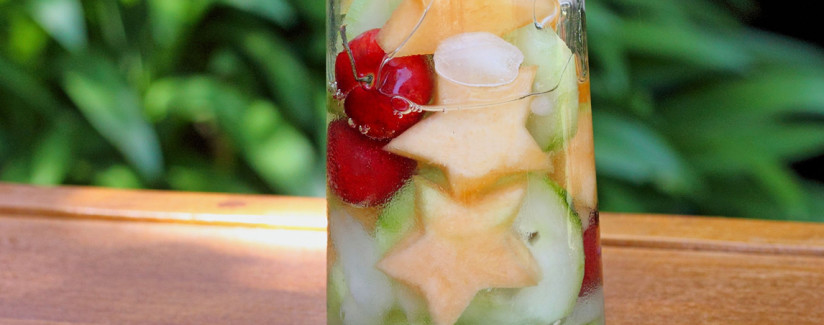
To Infuse or Not to Infuse?
A reader asked whether water infused with fruit like strawberries or oranges contains calories, carbohydrates and vitamins. Infused water is popular for those of us looking to add a little flavor to our lives, but are there other benefits besides curing the “bored with plain water” blues? We asked expert Dr. Wendy Dahl of the University of Florida for some answers.
According to Dr. Dahl, infused water is a simple and healthy way to make tasteless water more appealing without adding any artificial ingredients or extra calories.
How is it made?
The general procedure involves using fruits, vegetables, or herbs to “infuse” or “permeate” water by sitting in or near the water for at least 4 hours. Infusing at room temperature often speeds up infusion rate and typical infused water lasts 3-4 days refrigerated. Rinds from citrus fruits can add a bitter taste, so if using citrus, you may want to cut off the rind portion of the fruit.
Are there any benefits to infused water besides taste?
Some benefits of infused water include the potential for nutrients, colors and flavors found naturally in the ingredients you use to seep into the water with little to no added calories. Water-soluble vitamins such as B vitamins and vitamin C may leak out in the infusion process and can be found in the water.
It’s getting easier to infuse water as more infusion products are available in stores. Big infusion pitchers or individual infusion water bottles with a place to put fruits or vegetables can be found at your local supermarket. If you don’t want to break the bank, you can use a mason jar and strain out the fruit and vegetable pieces left in the water.
Looking for some infused water recipes? Here are a few worth trying!
Strawberry, Basil and Cucumber from BudgetSavvyDiva.com
Blueberry Orange Water from ThePeachKitchen.com
Strawberry, Orange, Lemon and Mint from EatDrinkShopLove.com
“Fruit Infused Water” by Dave Leonhardt is licensed under CC BY 2.0.


























